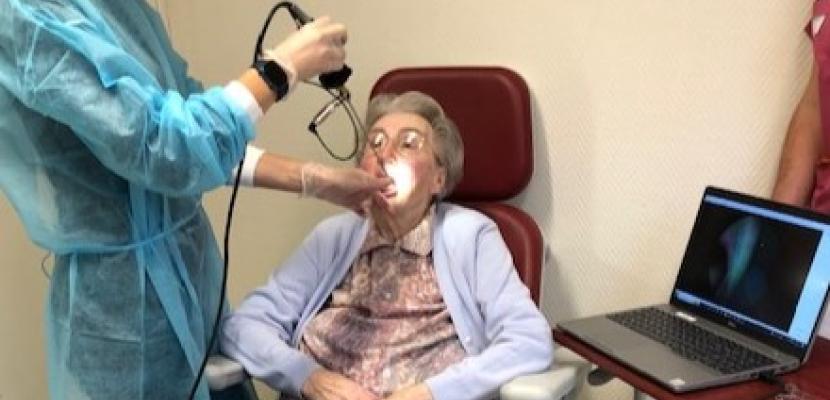
Tel-e-dent: assisted tele-expertise to provide dental care to nursing home residents in rural areas

About this good practice
WHY?
>CREUSE department: shortage of healthcare (36 dentists per 100,000 inhabitants in Creuse / 66 in France)
>The oral health in nursing homes: an identified but UNDERESTIMATED problem
>Specificity of the older population: their suffering is not expressed verbally, compliance with oral health care is poor, they may require specific care or be uncooperative or even opposed to dental care
>Lack of equipment for effective dental tele-expertise
FOR WHOM?
Non-cooperating and dependent people (seniors and people with disabilities)
WHAT IS IT FOR?
Tel-e-dent is based on videos taken by nurses using an ORL endoscope to examine the oral cavity of older people in institutions. The data and medical records are sent to the dental surgeon, who analyses the videos to establish a PRE-DIAGNOSIS. The process follows a precise protocol, using high-quality optical equipment, specially trained staff, and complies with all regulations. A NURSE trained in oral and dental telemedicine coordinates these examinations in nursing homes, allowing the dental surgeon to focus on the diagnosis.
3 STAGES: the application (submission, consent), making the video (nurse visit, oral cavity film), the response (report)
NEXT STEPS:
1/ Gradual roll-out to all nursing homes in Creuse
2/ Roll-out in the department of Corrèze
3/ New clinical research on disabled people in institutions
4/ Roll-out for people with disabilities in institutions
5/ Setting up specific tele-expertise training for nurses
Expert opinion
Resources needed
FINANCIAL
>Regional Health Agency, Nouvelle-Aquitaine Region and the Hospital of Guéret
>The State is financing a flat rate of €44 per procedure
>Hospital: staff costs
HUMAN
>Dental surgeons
>Nurses
>Coordinating doctor
>Secretarial staff
MATERIAL
>A PC
>Endoscopic surgery camera
>Software
Evidence of success
>Improving COORDINATION between healthcare professionals
>Improving the CARE PATHWAY
>Increased HEALTHCARE PROVISION (delegation of tasks, increase in dental surgeon activity, time savings for practitioners, improves territorial coverage)
>Improving the PATIENT APPROACH (trusting relationship, patients with specific needs)
>Economic gains (avoids costly travel)
>Presence in 15 of the 31 nursing homes of the department by 2023 (around 1,250 residents)
>An average of 300 EXAMINATIONS per year
Potential for learning or transfer
Tel-e-dent is a project that could be transferred to other regions thanks to several success factors:
>Validation of the process by ACADEMIC CLINICAL RESEARCH ensures professionalisation, legitimises the practice, and offers legal and insurance protection.
>The use of an APPROVED DIGITAL TOOL that ensures data confidentiality and cybersecurity is a key success factor. The use of secure remote transmission systems (PACS, DICOM format) guarantees the protection of the medical information exchanged.
>A TRUST-BASED approach and the ability to adapt to specific patient needs
>Optimising patient care by reducing the need for patients to travel, increasing the range of care offered by delegating tasks, and saving time for practitioners are all significant advantages.
>Adaptation to ALL REGIONS with a shortage of dental surgeons and training for nurses
>Practice transferable to other VULNERABLE groups (disabled people, etc.)
Further information
Tel-e-dent: testimonial by Dr Alain Queyroux (Hospital of Guéret)
Documents
CARES Tel-e-dent Good practice presentation.pdf
Good Practice template_Tel-e-dent.pdf
Research article - Accuracy of teledentistry for diagnosing dental pathology using direct examination as a gold standard_JAMDA.pdf
Website
Good practice owner
You can contact the good practice owner below for more detailed information.
